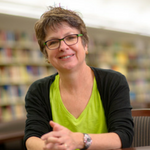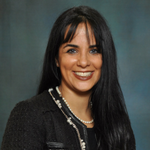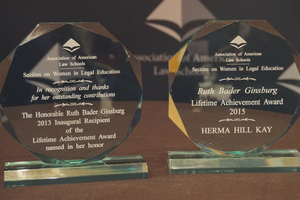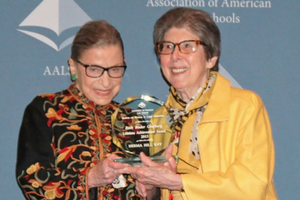AALS Sections provide a forum for law school faculty and staff and to connect on issues of shared interest. Each of the 100 AALS sections is focused on a different academic discipline, affinity group, or administrative area. For a full list of AALS sections and how to join, please visit www.aals.org/services/sections.
In this edition of “Spotlight on Sections” AALS spoke with the leadership of the AALS Section on Women in Legal Education.
The Section on Women in Legal Education provides information to its members concerning the integration of women and women’s concerns into the legal profession and the law, promotes the communication of ideas, interests, and activities among members of the Section, and makes recommendations on matters concerning the administration of law schools and on the status of women in legal education.

Rebecca E. Zietlow, University of Toledo College of Law, Chair (Photo courtesy of University of Toledo College of Law)

Kerri L. Stone, Florida International University College of Law, Chair-Elect (Photo courtesy of Florida International University College of Law)


Justice Ruth Bader Ginsburg presents the Section’s Lifetime Achievement Award to Herma Hill Kay at the 2015 AALS Annual Meeting.
RZ: The section is especially attuned to issues of diversity. Our genesis having been diversity, we’re concerned with the kind of issues that Kerri mentioned—viewpoints, but also gender and racial diversity on our panels, school diversity, status diversity, experience diversity.
KS: There is no one profile of a member of our section. If there were, we’d be doing something wrong. So we’re going to have speakers talking about the need for trigger warnings or increased sensitivity, and other speakers who will say “you know what, these are difficult subjects and lawyers have to deal with difficult things. To give an opt-out is not to give everyone the same level of education.” It’s a complex issue and we’re going to have a complex discussion about it.
RZ: The other program we’re doing is a speed mentoring program. That goes back to the crucial role our section has as being a place to network.
How did you choose that topic? Aspects of it seem to have been so present in the popular consciousness lately—campus sexual assault particularly, and trigger warnings.
RZ: We chose it both as a response to some members and it came out of a great conference call where we just brainstormed and came up with it. We work well together.
KS: If you look at our panel—one of the speakers is a friend of mine that I suggested, and he blogs a lot about this topic. He’s wonderful and pro-diversity. He’s raised this question a lot: there are things that have actually happened that we need to be able to talk about in a law classroom. We need to prep our students to handle them. If they can’t handle talking about them, we’re producing some lawyers that are less capable than others, and that’s not fair to anybody. So in a profession like this, we have a pedagogical need to discuss real-world events.
How do your section members interact and collaborate outside of the AALS Annual Meeting?
RZ: It starts with the annual Faculty Recruitment Conference. We rent a suite where candidates can come and spend time when they’re at the conference. Then we have a breakfast at the New Law Teachers Workshop and at the Clinical Conference where speakers come and give advice. We try to get people who have been teaching for a few years so they can relate to the new folks.
KS: We utilize our listserv a lot. And we have mentoring events where we pair people up. A lot of that [mentorship] happens informally, anyway. At some of the other conferences, we used to do “Marina dinners,” where Marina Angel would gather all the women from the section (and some new ones to invite in) at whatever conference we were attending. She’d say it’s not formal, it’s not sanctioned, but let’s get together, talk, and check in.
RZ: The section is quite active with many people involved on committees.
KS: I showed up to an Annual Meeting one year and I was pregnant. A lady came up to me and said “Oh, back in the day I was so afraid to tell my dean I was pregnant!” Another person came up to me and said “Do you want to co-author an article with me about x, y, and z?” There were so many hands extended and opportunities and shared experiences. Someone else was like “Does your back hurt? I have a great trick for that!” Every level of support. And I just showed up, I didn’t even say anything! That tells you a lot about our outreach.
Do you have a formal mentorship program, or does it just happen organically?
RZ: At least every other year we have some sort of mentoring activity at the Annual Meeting. Two years ago we had a networking program at our business meeting which a lot of people came to that was focusing on women deans. We try to do networking and mentoring as part of our programming regularly.
KS: Because if you are a woman and you’re considering applying for a deanship at your school, or applying to be the dean at your school, more often than not there aren’t women sitting where you want to sit. Sometimes there are and you’re lucky, and they may be willing to talk to you. But when you show up at our meeting, you can be surrounded by similarly-situated women who have done exactly what you want to do. And they can talk to you about the ins and outs of doing it as a woman.
How does your section support the scholarship of your members?
RZ: We try to reach out to people at every level, and to be inclusive in our programming. We sometimes have calls for papers for our conferences. I think that by organizing those daylong and other meetings, we’re giving a lot of opportunities to scholars to come, present their papers, and interact with each other.
KS: I’ve asked some members of the section to read my work and no one has ever said no. A lot of times I get unsolicited offers, people saying “Oh that’s so interesting, I’d be happy to take a look at that for you.” Those kind of offers started the minute I walked through the doors as an assistant professor. Again, this is an incredible resource.
What do you think makes people in your section so willing to do that? What are you doing right in your section that other sections might emulate?
RZ: The section exists to support to each other. I think encouraging people who are less senior to get actively involved in the section is a good thing to do. When you do panels, don’t just invite the top names in the field. Invite people who are newer or who teach at schools that aren’t in the top 20.
KS: Our ethos has always been to cultivate gratitude.
RZ: It’s a pay it forward thing.
KS: Many of the women in our section will tell you that they have been victims of discrimination in some form or another. Some will tell you that at some point in their career they were sexually harassed. Others will tell you it was more implicit—they didn’t give me this chance, but maybe they would have if they didn’t see me in whatever way. People in the section understand, there’s a common ground there.
And for everyone who can tell you they’ve been discriminated against, there’s someone who will say they’ve been helped along the way by other women—someone gave me advice, someone listened while I spoke, someone represented me well in a case. So there’s a sense of gratitude and of paying it forward. Going all the way back to those first women who were pioneers on faculties, who dealt with hostilities and indignities that we would never even dream we would experience today. We all stand on their shoulders. There’s a tremendous sense of “I want to pay this forward; I want to give back.” We have a great job, and it’s easy to take for granted. It is important to stay grateful.
What is your vision for the section, this year and in the years to come? What new initiatives would you like to see as part of the section?
RZ: First thing is to keep doing all the things we’re already doing. Second, we’ll work to bolster our oral history project and perhaps have some programming around that. I would also like to see us reactivate our formal mentorship program.
KS: For me, I’d like to see us continuing to recruit the most junior people as they come in so they don’t have to waste time feeling alienated or confused.
I’d like to see us maintain our reputation for every kind of diversity. There’s no one definition of feminism—everyone should feel welcome and comfortable. I would like to see us be the hosts of robust, provocative conversations and debates. Sometimes it’s too easy to talk about something because everyone will be on the same side, and the conversation is flat and monolithic. I think what we’re known for is putting it all out there. We look beneath the surface, and our discussions are intelligent and nuanced and provocative. People leave with a lot to think about, and I’m proud that we preside over conversations like that at conferences. We pick great topics and bring in great speakers and cover all viewpoints.
This section has the largest membership and we represent a lot of people. I hope we continue to do that to our utmost ability by making everyone feel welcome and keeping the level of things high.
I hope we help our members not only in their own careers—which we’re doing every step of the way through promotion, through their writing, through giving advice about their service as we’ve always done—but also help them become better teachers. I think we’re taking great strides toward that this year with our topics, because we’re not just women. We teach women. And we teach men who are going to interact with women every day. I think constantly striving to bring this awareness to our own careers and the careers of our students is central to what we’re doing.
I hope, one day, people think of our committee and the work we did, not only formally but also informally, and they look back on us the way Rebecca and I think about the women who brought us in and mentored us and helped us. I will never forget them when I think about my career. When I think about everything I’ve done and those who helped me and enabled it, I have a tremendous amount of gratitude. I hope one day there will be people who think about us as a group or individually and say “That was really helpful. I’m glad they did that. They brought me in, they introduced me to all these people, and I didn’t have to wonder, I didn’t have to worry. Things were brought to me and I’m grateful for that.”
I hope that one day people look at us in even close to the same way we look at the more senior women who did that for us. I would like to think that we’ve supported someone’s career.